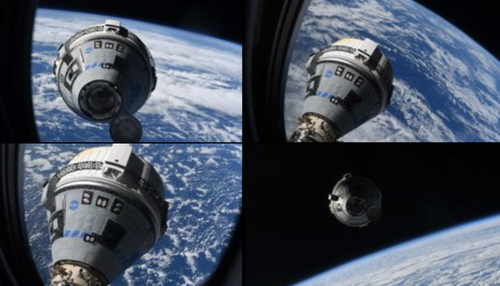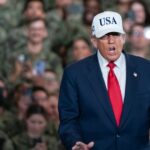
On Friday evening, Boeing's Starliner crew capsule successfully docked with the International Space Station (ISS), completing a significant milestone for the long-delayed spacecraft.
The uncrewed CST-100 Starliner linked up with the ISS at 2028 E.T. after launching from Cape Canaveral U.S. Space Force Base in Florida Thursday, according to Reuters.
NASA and Boeing used Starliner's flight as a test. They delivered 800 pounds of cargo to the ISS and "Rosie the Rocketeer," a mannequin outfitted with sensors to monitor the cabin environment that astronauts will experience during future flights.
👋 Hello, #Starliner! @BoeingSpace's human-rated spacecraft has arrived at the International @Space_Station for the first time, docking at 8:28pm ET (00:28 UTC). pic.twitter.com/gXceiHJhuB
— NASA (@NASA) May 21, 2022
"Thank you to the entire ops team for some great work tonight," ISS astronaut Robert Hines radioed down to Johnson Space Center after Starliner docked. "Great accomplishments in human spaceflight are long remembered by history. Today will be no different."
"So to Starliner, its commander Rosie the Rocketeer, and all the men and women who poured their hearts and souls into this vehicle and this mission, welcome to the International Space Station," Hines added.
Last night's successful docking is a giant step for Starliner to one day carry astronauts to the ISS and follows a failed attempt in 2019 that a software glitch prevented the capsule from orbiting.
Starliner will stay docked through early next week and prepare for a return flight to Earth Wednesday, landing in the New Mexico desert with parachutes.
Starliner could begin crewed missions as early as this fall if all goes well. It would be the second private US company to shuttle astronauts to and from the ISS. In 2020, Elon Musk's Crew Dragon capsule was the first time in nine years that a U.S. rocket took astronauts to the ISS since the space shuttle program ended.
The West is making every attempt to become less reliant on Russia for space operations as a fracturing of relations has been underway since the war in Ukraine.
On Friday evening, Boeing’s Starliner crew capsule successfully docked with the International Space Station (ISS), completing a significant milestone for the long-delayed spacecraft.
The uncrewed CST-100 Starliner linked up with the ISS at 2028 E.T. after launching from Cape Canaveral U.S. Space Force Base in Florida Thursday, according to Reuters.
NASA and Boeing used Starliner’s flight as a test. They delivered 800 pounds of cargo to the ISS and “Rosie the Rocketeer,” a mannequin outfitted with sensors to monitor the cabin environment that astronauts will experience during future flights.
👋 Hello, #Starliner! @BoeingSpace‘s human-rated spacecraft has arrived at the International @Space_Station for the first time, docking at 8:28pm ET (00:28 UTC). pic.twitter.com/gXceiHJhuB
— NASA (@NASA) May 21, 2022
“Thank you to the entire ops team for some great work tonight,” ISS astronaut Robert Hines radioed down to Johnson Space Center after Starliner docked. “Great accomplishments in human spaceflight are long remembered by history. Today will be no different.”
“So to Starliner, its commander Rosie the Rocketeer, and all the men and women who poured their hearts and souls into this vehicle and this mission, welcome to the International Space Station,” Hines added.
Last night’s successful docking is a giant step for Starliner to one day carry astronauts to the ISS and follows a failed attempt in 2019 that a software glitch prevented the capsule from orbiting.
Starliner will stay docked through early next week and prepare for a return flight to Earth Wednesday, landing in the New Mexico desert with parachutes.
Starliner could begin crewed missions as early as this fall if all goes well. It would be the second private US company to shuttle astronauts to and from the ISS. In 2020, Elon Musk’s Crew Dragon capsule was the first time in nine years that a U.S. rocket took astronauts to the ISS since the space shuttle program ended.
The West is making every attempt to become less reliant on Russia for space operations as a fracturing of relations has been underway since the war in Ukraine.







